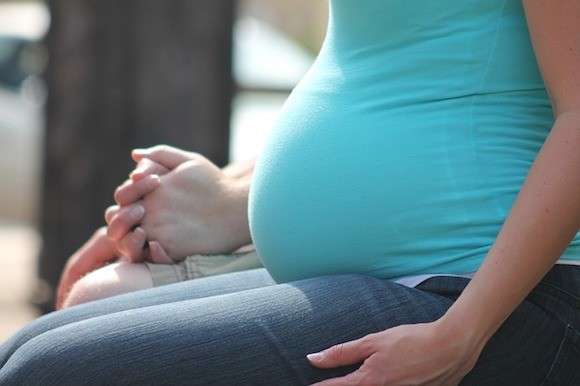Preeclampsia can strike unsuspecting mothers at any time during pregnancy. Credit: University of Melbourne
An international collaboration led by the Translational Obstetrics Group (TOG) based at Mercy Hospital for Women has discovered a treatment that could save many of the 60,000 lives lost each year to preeclampsia.
Preeclampsia can strike unsuspecting mothers at any time during pregnancy. It occurs when the preeclamptic placenta releases toxins that spread throughout the mother's circulation. These toxins damage blood vessels and injure major organs including the liver, kidneys, brain (causing fits), lungs and the blood clotting system.
Sadly, there is currently no treatment for preeclampsia other than to deliver the baby. When preeclampsia strikes at a preterm stage in pregnancy (<37 weeks gestation), doctors may be forced to deliver the baby early to save the mother's life. Prematurity puts babies at risk of death, disability and cerebral palsy.
However, TOG and their international collaborators have discovered the possibility that proton pump inhibitors, used by millions of people to treat gastric reflux and indigestion, could be used to treat preeclampsia.
University of Melbourne researcher Dr Natalie Hannan is the senior author of the study, the findings of which have just been published in the prestigious international journal Hypertension.
"We were astonished to find these common drugs switch off the production of toxins from the preeclamptic placenta and protect blood vessels from further injury," Dr Hannan said.
"Effectively, the team has identified one drug with dual actions that may powerfully counter the effects of preeclampsia", Professor Stephen Tong, head of TOG, continued.
The TOG team has already raced this finding into the clinic and set up a major clinical trial. The trial will test whether the proton pump inhibitor esomeprazole (or Nexium) can be used to treat women diagnosed with preeclampsia very early in pregnancy.
The PIE (Preeclampsia Intervention with Esomeprazole) trial is based at Tygerberg Hospital in Cape Town, South Africa. The team from Mercy Hospital for Women is collaborating with the local South African investigator, Dr Cathy Cluver.
South Africa was selected to run the first trial because developing countries have very high rates of preeclampsia. This is also where an effective treatment for the disease will have the most profound impact on maternal and childhood health.
The PIE trial is in its final stages and will provide an answer this year. Further trials in Australia are also planned.
"If proton pump inhibitors can reduce the burden of preeclampsia, it could save the lives of thousands of mothers and babies globally," Prof Tong said.
Journal information: Hypertension
Provided by University of Melbourne





















